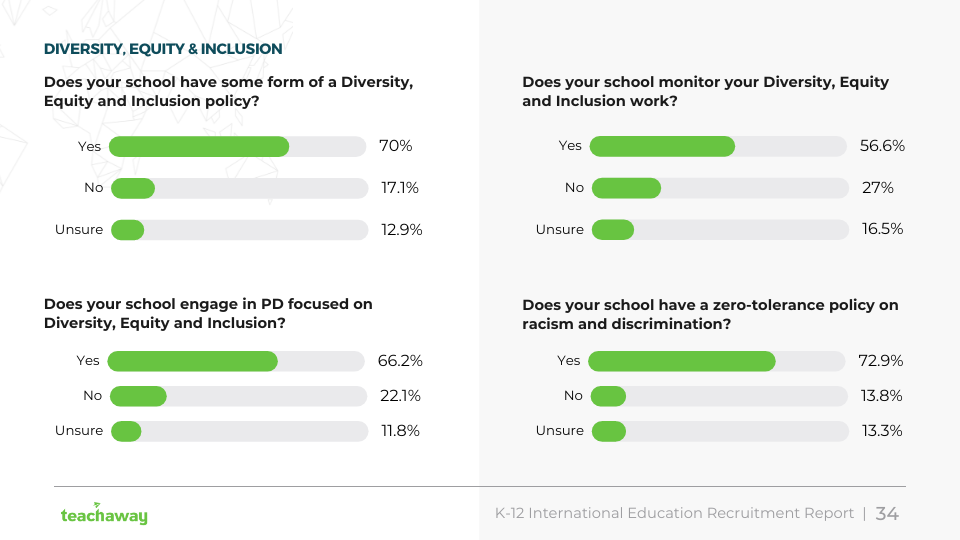Why is DEIJ Important? Understanding the Significance in International Education
For recruiters, hiring managers, and school leaders, embracing DEIJ principles is not just a moral imperative, it’s a strategic necessity in fostering a thriving educational community that celebrates and supports individuals from all backgrounds.
Do all schools have DEIJ policies?
According to the International Education Recruitment Report 2024 survey, 70% of teachers say that their schools do, while 17% say their schools do not. The remaining 13% are unsure.

Only 56% of schools with DEIJ policies monitor activities
Most schools with DEIJ policies and actions have a monitoring system in place to hold schools accountable: 56% of teachers report that such activities are monitored while 27% of teachers say these activities are not monitored, and the remaining are unsure.
Progress is not a race, and there’s a lot to learn about what an effective DEIJ policy looks like, but that’s why having one is the first step.
3 Reasons Why Your School Should Have a DEIJ Policy in 2024
Reduce Legal Risks and Liabilities
Implementing DEIJ policies can help schools mitigate legal risks and liabilities related to discrimination and harassment.
By proactively addressing issues of equity and inclusion, schools can create a safer and more supportive learning environment for all students, staff, and stakeholders.
This can help to reduce the likelihood of costly legal disputes, investigations, and settlements related to allegations of discrimination or bias.
Additionally, demonstrating a commitment to DEIJ principles can enhance a school’s reputation and credibility within the legal and regulatory community, further reducing the risk of legal challenges.
Using an ATS with built-in features that leverage technological capabilities is one way to revolutionize your recruitment strategy.
Teach Away’s ATS has such a feature that allows recruiters to apply citizenship filters to ensure unbiased candidate assessments during your hiring process.
To Stand With Other Change Makers on the International Education World Stage
While recognition may be seen as a vanity metric, your school’s proven ability to lead with change will be a goal others will aspire to replicate.
The Ron Clark Academy (RCA) in Atlanta, Georgia, is a great example. RCA is a private, nonprofit middle school that has gained widespread acclaim for its innovative approach to education, including its emphasis on diversity, equity, and inclusion.
The school is known for its culturally responsive teaching practices, immersive learning experiences, and commitment to empowering students from diverse backgrounds.
RCA’s founder, Ron Clark, is a renowned educator who has been recognized for his dedication to fostering a positive school culture and promoting social justice in education.
Through initiatives such as the “House System,” where students are grouped into diverse teams to promote collaboration and mutual support, RCA creates an inclusive environment where every student feels valued and respected.
The success of the Ron Clark Academy has led to its recognition as a model for 21st-century education and has inspired educators and school leaders worldwide to adopt similar DEIJ initiatives in their own institutions.
This is a widely recognized, real-world demonstration of the transformative impact of DEIJ policies in education.
Impact on Students
Students who experience success in environments fostering cultural awareness and sensitivity often become role models and leaders who inspire future generations.
By demonstrating the importance of diversity, equity, and inclusion in their actions and achievements, these students pave the way for others to follow in their footsteps.
They open doors for future generations by breaking down barriers, challenging stereotypes, and advocating for positive change in their communities and beyond.
It would be without a doubt that students will be able to attribute a lot of their learned outcomes from their school upbringing.
In essence, robust professional development and DEIJ initiatives play pivotal roles in nurturing teacher wellbeing. Improving resource alignment, communication, and the effectiveness of supervision programs can enhance satisfaction, retention, and overall teacher growth within schools.
-Teacher Wellness Update from the International Education Recruitment Report 2024
Evidence Suggests That Organizations With Diverse And Inclusive Workplaces Tend To Perform Better Financially
By embracing DEIJ principles, schools can tap into the full potential of their workforce, leading to higher levels of productivity, innovation, and performance.
Additionally, a diverse and inclusive school community can attract a broader base of support from donors, sponsors, and funding agencies who value equity and social justice.
This can result in increased financial resources and sustainability for the school, supplementing your school’s long-term recruitment strategy.
The Ripple Effect of DEIJ Policies
Implementing a DEIJ policy in a school initiates a ripple effect that extends far beyond its immediate community. By fostering a culture of diversity, equity, inclusion, and justice, the school empowers students to become advocates for positive change in their communities.
As students graduate and enter the workforce, they carry with them the values and principles instilled by their educational experience, influencing societal norms and driving broader efforts towards creating a more equitable and inclusive world.
This ripple effect amplifies the impact of the school’s DEIJ policy, creating lasting change that transcends generations.
If you’d like more tips for your recruitment strategy, contact sales in the form below.
